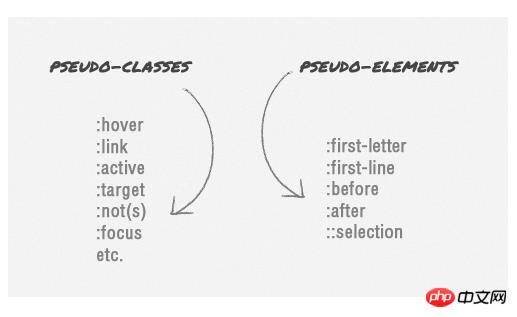
层叠样式表(CSS)主要用于将样式应用于HTML标记,但是在某些情况下,当向文档添加额外标记是多余的或不可能时,实际上CSS中有一个功能允许我们添加额外的标记而不会中断实际文件,即伪元素。
相信你已经听说过这个术语,特别是当你学习过一些课程时。(推荐课程:css视频教程)
实际上有被分类的几个CSS伪元素,如:first-line,:first-letter,::selection,:before和:after。但是,对于本文我们仅限于说一说:before和:after,“伪元素”在这里将具体指代它们,我们下面将从基础知识开始深入理解css伪元素:before和:after。
css伪元素的语法和浏览器支持
:before和:after伪元素其实一直围绕于CSS1,但我们在这里讨论的是发布于CSS2.1的:before和:after。在开始时,伪元素使用单冒号的语法,那么作为web发展而来的,CSS3的伪元素被修改,以使用双冒号成为::before&::after-将其与区分伪类(即:hover,:active,等等)。

但是,无论您使用单冒号还是双冒号格式,浏览器仍然会识别。并且由于Internet Explorer 8仅支持单冒号格式,因此如果您想要更广泛的浏览器兼容性,则使用单冒号更安全。
css伪元素有什么作用?
简而言之,伪元素将在内容元素之前或之 后插入一个额外元素,因此当我们将它们两者相加时,它们在技术上是相等的,具有以下标记。
<p> <span>:before</span> This the main content. <span>:after</span> </p>
但这些元素实际上并未在文档中生成。它们在表面上仍然可见,但不会在文档源上找到它们,因此实际上它们是伪元素。
伪元素的用法
使用伪元素相对容易; 以下语法selector:before将在内容的选择器之前添加一个元素,而此语法selector:after将在其后添加,并且为了在其中添加内容,我们可以使用content属性。
例如,下面的代码段会在之前和之后添加引号blockquote。
blockquote:before {
content: open-quote;
}
blockquote:after {
content: close-quote;
}样式伪元素
尽管伪元素是伪元素,但伪元素实际上就像一个“真实”元素; 我们可以在它们上添加任何样式声明,例如更改颜色,添加背景,调体大小,对齐文本内部等等。
blockquote:before {
content: open-quote;
font-size: 24pt;
text-align: center;
line-height: 42px;
color: #fff;
background: #ddd;
float: left;
position: relative;
top: 30px;
}
blockquote:after {
content: close-quote;
font-size: 24pt;
text-align: center;
line-height: 42px;
color: #fff;
background: #ddd;
float: right;
position: relative;
bottom: 40px;
}css伪元素指定尺寸
默认情况下,生成的元素是内联级元素,因此当我们要指定高度和宽度时,我们必须首先使用display: block声明将其定义为块元素。
blockquote:before {
content: open-quote;
font-size: 24pt;
text-align: center;
line-height: 42px;
color: #fff;
background: #ddd;
float: left;
position: relative;
top: 30px;
border-radius: 25px;
/** define it as a block element **/
display: block;
height: 25px;
width: 25px;
}
blockquote:after {
content: close-quote;
font-size: 24pt;
text-align: center;
line-height: 42px;
color: #fff;
background: #ddd;
float: right;
position: relative;
bottom: 40px;
border-radius: 25px;
/** define it as a block element **/
display: block;
height: 25px;
width: 25px;
}附上背景图片
我们也可以用图像而不是纯文本替换内容。虽然该content属性提供了一个url()插入图像的字符串,但在大多数情况下,我更喜欢使用该background属性来更多地控制附加的图像。
blockquote:before {
content: " ";
font-size: 24pt;
text-align: center;
line-height: 42px;
color: #fff;
float: left;
position: relative;
top: 30px;
border-radius: 25px;
background: url(images/quotationmark.png) -3px -3px #ddd;
display: block;
height: 25px;
width: 25px;
}
blockquote:after {
content: " ";
font-size: 24pt;
text-align: center;
line-height: 42px;
color: #fff;
float: right;
position: relative;
bottom: 40px;
border-radius: 25px;
background: url(images/quotationmark.png) -1px -32px #ddd;
display: block;
height: 25px;
width: 25px;
}但是,正如从上面的代码片段中看到的那样,及时content属性中内容是空字符串我们仍然声明了它。content表示的是一项要求,应始终存在; 否则伪元素 将无法正常工作。
结合伪类
伪类和伪元素虽然不同,但是我们可以在一个CSS规则中将伪类与伪元素一起使用,例如,如果我们想要将引号背景稍微变暗,当我们将鼠标悬停在其上时blockquote的变化代码如下。
blockquote:hover:after, blockquote:hover:before {
background-color: #555;
}添加过渡效果
我们甚至可以将transition属性应用于它们以创建一些好看的过渡效果。
transition: all 350ms; -o-transition: all 350ms; -moz-transition: all 350ms; -webkit-transition: all 350ms;
不过可惜的是转换效果似乎只适用于最新版本的Firefox。所以希望更多的浏览器能够赶上,允许将来在过渡属性中应用伪元素。
Atas ialah kandungan terperinci 深入理解css伪元素:before和:after(附示例). Untuk maklumat lanjut, sila ikut artikel berkaitan lain di laman web China PHP!
 Apa yang salah dengan telefon bimbit saya yang boleh membuat panggilan tetapi tidak melayari Internet?
Apa yang salah dengan telefon bimbit saya yang boleh membuat panggilan tetapi tidak melayari Internet?
 Bagaimana untuk memulihkan data pelayan
Bagaimana untuk memulihkan data pelayan
 Gaya bar skrol CSS
Gaya bar skrol CSS
 Bagaimana pula dengan Ouyi Exchange?
Bagaimana pula dengan Ouyi Exchange?
 Apakah sistem pengurusan biasa?
Apakah sistem pengurusan biasa?
 Bagaimana untuk mencari lokasi telefon bimbit orang lain
Bagaimana untuk mencari lokasi telefon bimbit orang lain
 Penggunaan getproperty
Penggunaan getproperty
 Apakah maksud kod sumber terbuka?
Apakah maksud kod sumber terbuka?